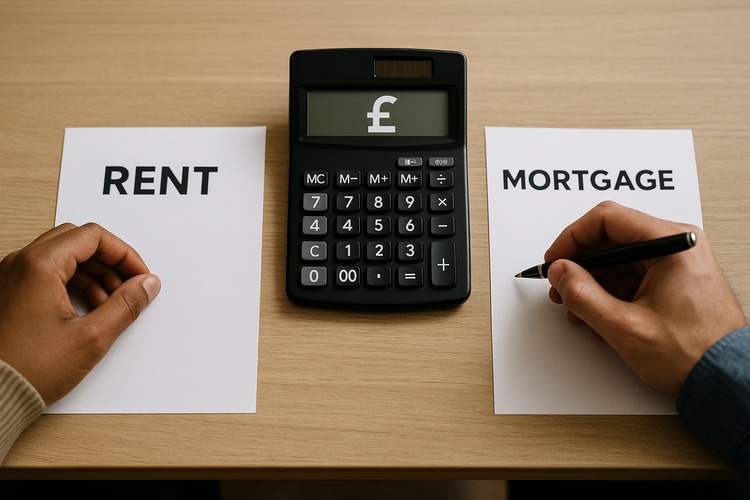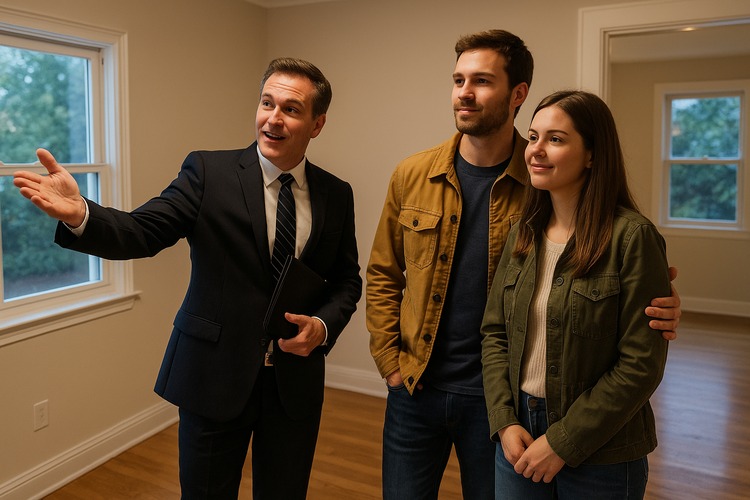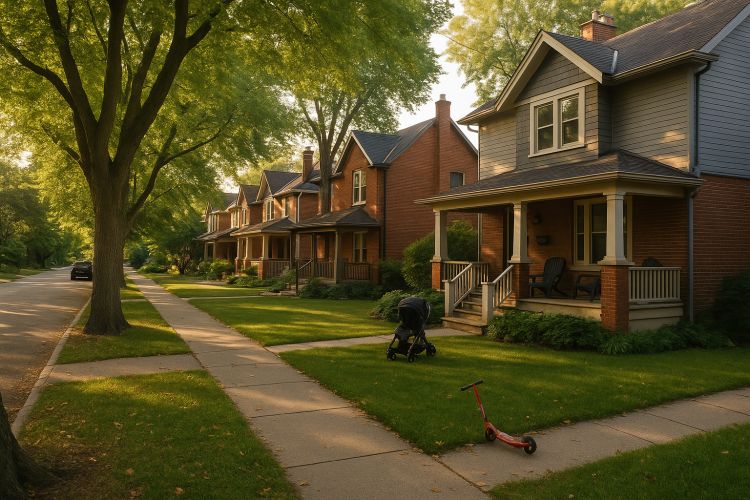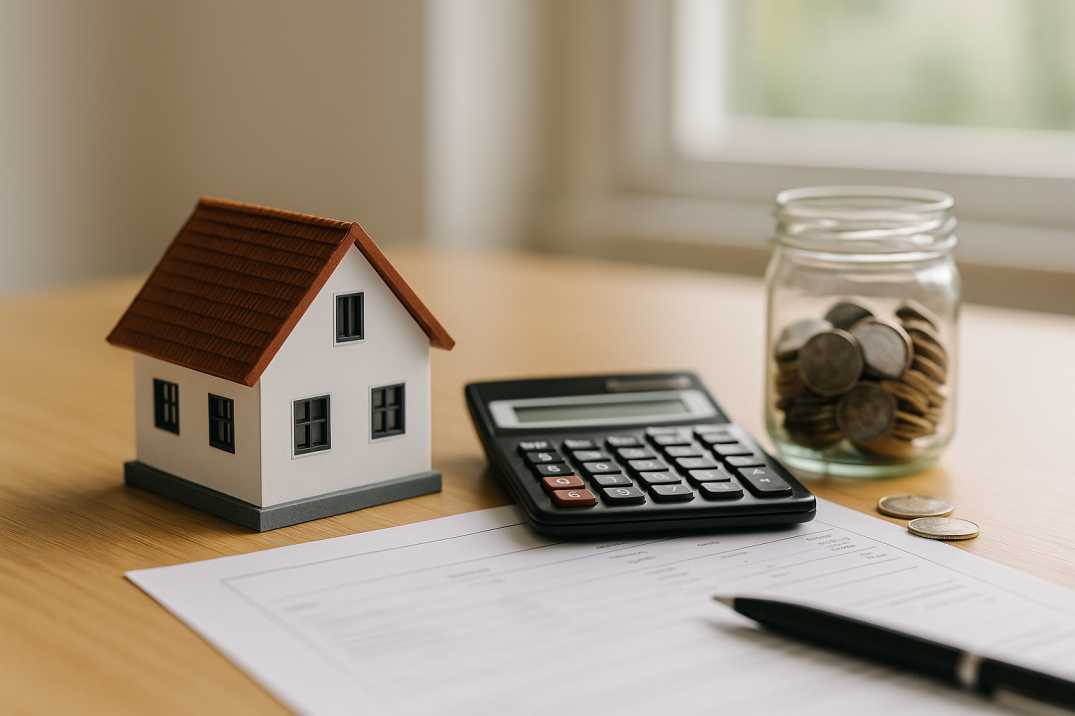The honest answer? It depends on three key factors: your timeline, your financial readiness, and your lifestyle needs. Neither renting nor buying is universally superior. In the Greater Toronto Area’s 2025 market, with home prices down 4.3% year-over-year and mortgage rates at their lowest since 2022, both options present distinct advantages depending on your circumstances. In this guide, our team at Nave Real Estate breaks down the real costs, timing considerations, and decision frameworks to help you determine which path aligns with your situation.
TL;DR
- Neither renting nor buying is universally better across all situations and timelines
- Buying typically makes financial sense if you’re staying 5+ years in the GTA
- Renting offers flexibility and avoids the substantial upfront costs and maintenance responsibilities
- The 2025 GTA market favors buyers with declining prices and improved mortgage rates
- Hidden homeownership costs often surprise first-time buyers and can add $1,500+ monthly beyond mortgage payments
The Real Cost Comparison: Renting vs. Buying in the GTA
Understanding whether it’s better to rent or buy a house starts with comparing the true monthly costs and upfront expenses. Many people only compare rent to mortgage payments, but that misses half the picture.
Let’s break down real 2025 GTA numbers. The average one-bedroom apartment in Toronto rents for approximately $2,079 per month as of June 2025, with rents declining for 11 consecutive months [1]. Keep in mind that average rent prices by Toronto neighbourhood change a lot. Downtown costs much more than areas like Scarborough or North York. When you add tenant insurance at roughly $25 monthly and utilities if not included, your total monthly housing cost sits around $2,200 to $2,400. Ontario’s rent increase guideline caps annual increases at 2.5% for 2025/2026, providing predictable housing costs [2].
Now consider buying. The average GTA home sells for $1,059,377 as of September 2025 [3]. With the minimum down payment of 5% on the first $500,000 and 10% on the remaining amount, you need approximately $53,000 upfront just for the down payment. Your mortgage at today’s rate of 3.89% would cost roughly $4,775 monthly. But the hidden costs of homeownership extend well beyond that mortgage payment.
Property taxes in Toronto increased 6.9% for 2025, combining a 5.4% residential increase with a 1.5% City Building Fund levy [4]. On a million-dollar home, expect approximately $500 monthly in property taxes. Home insurance averages $1,814 annually in Toronto, adding another $151 per month [5]. Industry experts recommend budgeting 2% of your home’s value annually for maintenance and repairs. That’s $21,200 yearly or roughly $1,767 monthly for unexpected furnace replacements, roof repairs, and regular upkeep.
Your total monthly homeownership cost? Approximately $7,193, compared to $2,300 for renting.
The upfront costs of buying a home vs renting create another significant difference. Renters typically need first and last month’s rent plus moving costs, totaling around $5,000. Buyers face down payments, land transfer taxes (both provincial and municipal in Toronto, roughly $31,000 combined on a million-dollar home), legal fees, home inspections, and moving costs. Your total upfront investment exceeds $86,500 before you even move in.
If you’re wondering how much rent you can afford, online calculators can help you budget appropriately for your income level and ensure you’re making decisions based on your actual financial capacity rather than aspirations alone.

When Renting Makes More Financial Sense
Renting isn’t “throwing money away.” It’s a strategic financial choice that makes perfect sense in specific situations. In 2025’s GTA market, with falling rental prices and rising ownership costs through property tax increases, understanding when renting wins becomes especially important.
Short-Term Timelines (Less Than 5 Years)
The breakeven point between renting and buying typically falls between five and seven years in the GTA. This represents when the cumulative costs of renting begin exceeding the total costs of buying, including all those substantial upfront expenses. If you’re planning to relocate within three years for career opportunities, education, or lifestyle changes, those transaction costs devour any potential appreciation gains.
Consider this: selling a home involves real estate commissions (typically 5% of the sale price), legal fees, potential staging costs, and the stress of timing your sale with your next purchase. On a million-dollar home, that’s $50,000 in selling costs alone. If you’re asking yourself whether it’s better to rent or buy a house right now while your career path remains uncertain, renting preserves both your financial flexibility and your sanity.
Investment Flexibility and Alternative Strategies
The money not locked into a down payment and home maintenance can work for you elsewhere. That $53,000 down payment invested in a diversified portfolio earning 6% annually grows to approximately $70,900 over five years. Meanwhile, the difference between your monthly rent and what you’d pay in total homeownership costs could fund your First Home Savings Account or RRSP, building toward a future purchase when your situation stabilizes.
This strategy of equity building vs investing while renting offers portfolio diversification that homeownership cannot match. Your investment portfolio remains liquid for emergencies, opportunities, or life changes. Your home equity stays locked in place until you sell.
Some people ask if they can rent out their house with a normal mortgage to make extra money. This can work, but check with your lender first.
Current GTA Market Timing (2025 Context)
Many people wonder whether it’s better to buy or rent a house right now given 2025’s unique market conditions. GTA home prices declined 4.3% year-over-year through September 2025, with some suburbs like Vaughan down 12.9% and Richmond Hill down 11.9% [3]. Rental supply increased significantly, softening rents after years of rapid growth.
The Bank of Canada cut rates to 2.5% in September 2025, with prime rates falling to 4.7% and expectations of further cuts ahead. If you’re not financially prepared to buy immediately, waiting several months might position you to purchase at even lower prices with better rates. The current buyer’s market creates less urgency than the frenzied seller’s market of recent years.
| Factor | Renting | Buying |
| Monthly Cost (GTA Average) | $2,300 | $7,200 |
| Upfront Investment | $5,000 | $86,500+ |
| 5-Year Total Cost | $138,000 | $432,000 |
| 5-Year Equity/Savings Built | $70,900 (if invested) | $95,000 (approximate) |
| Mobility/Flexibility | High (30-60 days notice) | Low (months to sell) |
| Maintenance Responsibility | Landlord | Owner |
When Buying Makes More Financial Sense
While renting offers clear advantages for shorter timelines and uncertain situations, buying becomes advantageous when specific conditions align. In the GTA’s current buyer’s market, those with stable situations and long-term plans may find unprecedented opportunities.
Long-Term Wealth Building Through Homeownership
Mortgages function as forced savings accounts. Every payment builds equity, and you cannot easily withdraw that money for impulse purchases. Over 10 years on a million-dollar home with 20% appreciation (conservative by historical GTA standards), you build roughly $285,000 in equity after accounting for interest paid. That represents substantial wealth accumulation that monthly rent payments never provide.
The concept of equity building vs investing while renting depends heavily on your timeline and discipline. Real estate offers leverage that few other investments match. You control a million-dollar asset while only investing $53,000 upfront. When that asset appreciates 3% annually, you earn returns on the full property value, not just your down payment. That’s powerful wealth building over decades.
Having worked in GTA real estate for 30 years, I’ve watched multiple market cycles. Those who bought during corrections and held long-term consistently built more wealth than those who waited for “perfect” conditions that never materialized. The key phrase remains “long-term.” Renting vs. buying long-term investment outcomes tip decidedly toward ownership for those staying put.

Stability, Control, and Tax Advantages
Your mortgage payment remains fixed for your term length, while rents increase annually. That 2.5% rent increase might seem modest until you calculate its cumulative impact over a decade. A $2,300 monthly rent becomes $2,931 after 10 years of 2.5% annual increases. Your $4,775 mortgage payment stays constant (or decreases if you chose a variable rate and rates drop further).
Ownership provides renovation freedom. Want to knock down that wall, install heated floors, or build a deck? It’s your house. Renters need landlord approval for even minor changes. You can paint walls whatever colour suits you, adopt that dog you’ve always wanted, and install the smart home technology that enhances your daily life.
The tax benefits of owning a home in Canada centre on the principal residence exemption. When you eventually sell your primary residence, all capital gains remain tax-free. That $200,000 appreciation over 10 years costs you nothing in taxes. Investment properties and stock portfolios don’t receive this generous treatment.
Understanding Your Breakeven Point
The breakeven point between renting vs. buying represents the number of years you must own before buying becomes financially advantageous over renting. This calculation considers your down payment, closing costs, ongoing ownership expenses, home appreciation, mortgage interest, and the alternative returns you’d earn by investing your down payment instead.
In the current GTA market, most break-even analyses land between five and seven years, though your personal situation might differ. A renting vs. buying calculator helps you run numbers specific to your income, savings, target home price, and intended timeline. These calculators account for tax deductions, appreciation rates, and opportunity costs.
If you know you’re staying in the GTA for a decade, buying makes clear financial sense despite those daunting upfront costs. If you might relocate within three years, renting preserves flexibility and probably saves money. The murky middle ground of four to six years requires careful analysis of your specific numbers.
Beyond the Numbers: Lifestyle Factors That Matter
Money matters, but when people ask, “Is it better to rent or buy a house,” the real question often involves lifestyle fit, family planning, and personal values that calculators cannot capture.
Your life stage and family plans influence this decision significantly. Growing families need space, stability, and access to good schools. Multigenerational households common in many GTA communities often require homeownership for adequate space and the ability to modify living arrangements. Young professionals exploring career options benefit from renting’s flexibility to relocate quickly for opportunities.
Career stability plays a crucial role. Secure employment in stable industries supports mortgage commitments. Contract work, commission-based income, or industries experiencing disruption suggest maintaining flexibility through renting until your income stabilizes. Remote work opportunities might let you consider more affordable GTA suburbs, potentially making homeownership more achievable than downtown rentals.
You’ll also need to decide if short-term vs long-term rentals work better for you. Month-to-month costs more but gives you freedom to move quickly.
Understanding what salary you need to live in Toronto helps frame realistic expectations about whether you can afford ownership or should focus on finding suitable rentals. When comparing downtown vs. suburban rentals in Toronto, you’ll find vastly different price points that might make renting downtown more affordable than buying in the suburbs, or vice versa.
Personal risk tolerance matters more than most people acknowledge. Some individuals feel secure carrying a large mortgage, viewing it as manageable debt that builds wealth. Others experience anxiety about debt and prefer the financial simplicity of renting. Neither perspective is wrong. Your emotional comfort with financial obligations affects your quality of life beyond any spreadsheet analysis.
Newcomers to Canada face unique considerations. Building Canadian credit history, understanding local real estate practices, and establishing employment stability often make renting the practical first step. Most homeowners in Canada rent for an average of 8.5 years before purchasing their first home, though 25% bought within two years. There’s no single “right” timeline.
Making Your Decision: A Practical Framework
Rather than asking whether it’s universally better to buy a house or rent, evaluate your specific situation using this decision framework developed from 30 years of GTA real estate experience.
Before diving into this framework, remember that any complete guide to renting an apartment or house in Toronto starts with knowing your true budget and needs.
Start with the timeline test. Planning to stay less than three years? Renting makes strong financial sense in virtually every scenario. The transaction costs of buying and selling simply eat any potential gains. Staying three to five years? Run detailed calculations using a renting vs buying calculator with your specific numbers. Don’t rely on generic advice or rough estimates when making this rent vs. own financial comparison. Timeline of five-plus years? Buying likely makes financial sense if you’re otherwise ready.
Assess your financial readiness honestly. Can you afford the down payment without depleting your emergency fund? Does your stable income support the 39% housing cost ratio that lenders require? Have you achieved a credit score above 650? Does your debt-to-income ratio stay under 44%? Do you genuinely understand total ownership costs beyond just mortgage payments? If you answered “no” to multiple questions, focus on strengthening your financial position while renting.
Consider current market conditions, but don’t obsess over timing the market perfectly. Yes, 2025 offers better opportunities than 2022’s peak prices. Yes, continued rate cuts might improve affordability further. But waiting for the absolute bottom of the market often means missing good opportunities. Your personal readiness matters more than catching the theoretically perfect moment.
Evaluate lifestyle alignment. How does each choice support your long-term goals? Does your family situation require stability or benefit from flexibility? Does your career trajectory suggest staying in the GTA or potentially relocating? These personal factors often matter more than purely financial considerations.
For those exploring alternative paths, rent-to-own arrangements offer a hybrid approach where a portion of your monthly rent applies toward a future down payment. This works best when you’re almost ready to buy but need time to improve credit, save more money, or establish employment history. However, these arrangements carry specific legal and financial complexities that require careful evaluation with professional guidance.

Conclusion
The question of whether it’s better to rent or buy a house in the GTA has no universal answer. Both options represent valid financial strategies depending on your timeline, financial situation, and lifestyle needs. In 2025’s buyer’s market, with home prices stabilizing and mortgage rates declining, opportunities exist for those ready to buy. Simultaneously, softening rental prices and increasing supply make renting more affordable than in recent years.
Focus on your specific circumstances rather than chasing theoretical perfect timing. Run the numbers honestly, consider your lifestyle needs, and make an informed choice that supports your long-term goals. Whether you choose to rent or buy, you’re making a housing decision that serves your current situation while positioning you for future success.
FAQ
Is it better to rent or buy a house in 2025?
Is it better financially to rent or buy a house?
When is it better to rent or buy a house?
Is it better to rent to own or buy a house?
Is it better to buy a house or rent an apartment?
References
[1] liv.rent – June 2025 Toronto Rent Report – https://liv.rent/blog/rent-reports/june-2025-toronto-rent-report/
[2] Ontario Rent Increase Guidelines – liv.rent Toronto Rent Reports – https://liv.rent/blog/rent-reports/
[3] WOWA.ca – Toronto Housing Market October 2025 Update – https://wowa.ca/toronto-housing-market
[4] City of Toronto – 2025 Property Tax Rates and Fees – https://www.toronto.ca/services-payments/property-taxes-utilities/property-tax/property-tax-rates-and-fees/
[5] MyChoice – How Much is Home Insurance in Ontario 2025 – https://www.mychoice.ca/blog/how-much-is-home-insurance-in-ontario/






